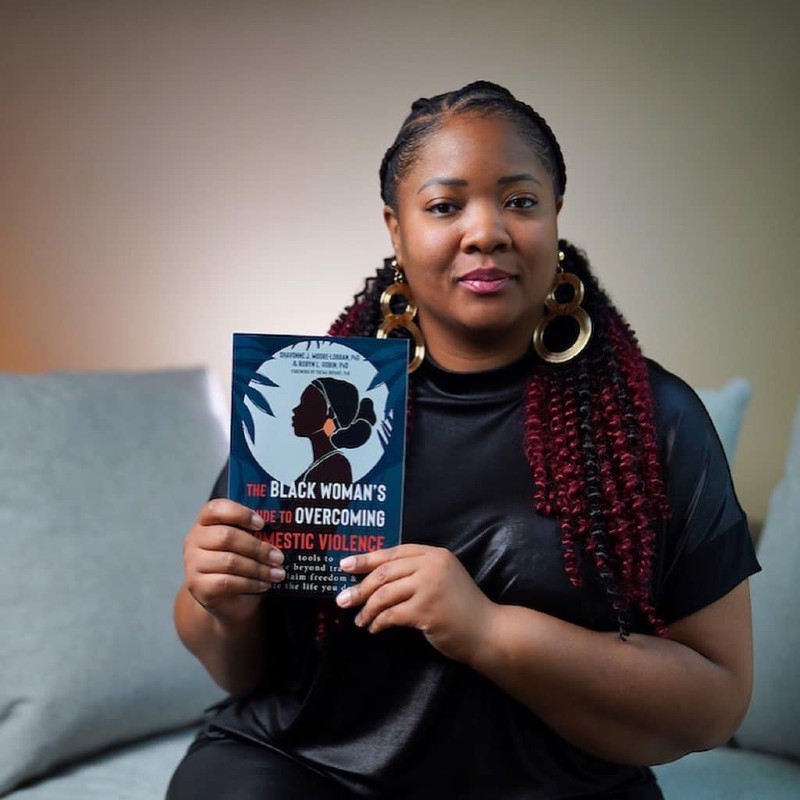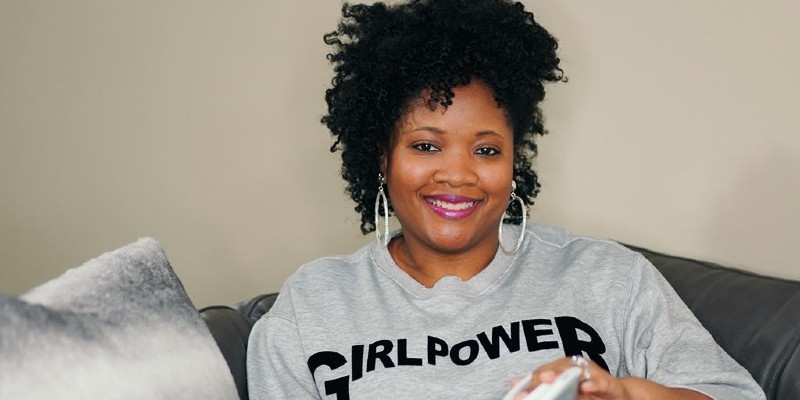In the last paragraph of her bio, Dr. Robyn Gobin describes herself and her work in this way:
I am a Black woman on a mission to live a more radical self-loving, liberated, unapologetic, empowered, purpose-driven, and joy filled life. I hope to inspire you to do the same!
As an author, licensed clinical psychologist, assistant professor, mindfulness coach, speaker, and podcaster, she truly lives and breathes this mission. In 2019, she published The Self-Care Prescription: Powerful Solutions to Manage Stress, Reduce Anxiety, and Enhance Well-Being. Her latest book, The Black Woman’s Guide to Overcoming Domestic Violence, co-authored with Dr. Shavonne Moore-Lobban, was released last month. I spoke to Gobin about her work and her passion for helping women, particularly Black women, heal from trauma and find the mental health care that they need.
Smile Politely: What inspired you to go into psychology, and specifically trauma-related care?
Dr. Robyn Gobin: I think the earliest influence was really my community. I grew up in the South. I grew up in a Christian family. I went to church a lot and saw challenges that people had — like depression — even though I didn’t have a label for it at that time. I saw people not living their best lives. Not being mentally healthy or happy. I was always [thinking] “what can I do to help people in my community feel better and live more fulfilling lives?” As a senior in high school I took an AP Psychology course and I fell in love with it — the idea that there was a science and a practice that could explain why some people experience certain things. More importantly, there was a science and practice that could help people overcome symptoms of depression, anxiety, and PTSD. That really spoke to me. I set my mind on it from that point on and have been going down that path ever since.
SP: What has informed the trauma care work that you do?
Gobin: It was really important to me to do work that’s informed by research and science, so that I know it’s the most effective. Also, it was important to me, in addition to doing research, to have impact in the community. That’s when I started to focus on the clinical aspect. I veered into the trauma direction because I went to an all women’s college, and one of the challenges that many women face is domestic violence, sexual assault, childhood abuse, and that was super interesting to me — that women have this unique propensity to experience these things. Some people have those early life experiences and they go on to flourish in life, and other people have those experiences and they end up developing symptoms of depression or PTSD. So one of the huge questions that I had was what differentiates those who recover on their own, and those who need a little bit more help.
I went on to graduate school to focus and specialize in trauma because I was so captivated by this question.
Then from understanding those risk factors, I could be a vehicle to help people understand their risk and help them to overcome some of the challenges they may be experiencing.
SP: You are specifically focused on culturally diverse communities, and trauma within those communities. What are some of the unique challenges that you are hoping to address?
Gobin: One of the things at the base level is that women of color in particular have this double marginalization status. They aren’t only women in a society that’s primarily patriarchal, they’re also women of color. They experience not only sexism but racism, racial oppression, and systemic oppression. It changes the resources you might have access to in trying to get therapy or heal from trauma. It changes the social support network that you might find yourself in. It changes how you might be responded to in the legal system. And it changes the propensity for some women to want to get the legal system involved because, for example, Black men have historically been abused in the justice system. So when you think [as a Black woman] “okay this Black man has abused me, and I want justice, but I also want to protect my culture, so I don’t want to send another Black man into the criminal justice system just to be unfairly treated.” Sometimes in the Black community Black women have either implicit or explicit messages encouraging them to keep it to themselves: “This is just what happens. It happened to my mom, it happened to my grandmother, it’s just something that you deal with.” That’s just a small part of the cultural piece. Women who are not a part of communities of color don’t have to grapple with those challenges as much when they think about seeking justice or disclosing their traumatic experiences.
SP: We’re facing a mental health crisis in this country, exacerbated by the stresses of the last two years. What more do you think needs to be done to support people who are dealing with trauma and mental illness right now?
Gobin: There’s definitely an increased awareness around the importance of mental health. Prior to COVID I think people kind of acted like it didn’t exist, or it was much more stigmatized. There is still stigma around mental illness and therapy, so I think a way to go is just more knowledge, more information for people to understand their options when it comes to handling their mental health. A huge barrier for a lot of people is: “Well I’m not that bad. I want to reserve the resources for people who need inpatient hospitalization.” That’s a totally different sector of the mental health field. I think increasing people’s mental health literacy [is important]. When has it gone from me just being stressed out to me actually being depressed or anxious. When does it reach a clinically significant level of distress, that you would benefit from therapy? Also normailzing that we are in “unprecendented times”. We’re all back outside and we’re traveling again and the world has opened up, but we’re still in the midst of a global pandemic on top of racism, sexism, xenophobia…all of these things that people are contending with, particularly people with multiple marginalized identities. We need to normalize having a reaction to the oppression, stress, and uncertainty you’re facing. It would be abnormal to act as if everything was okay.
Another challenge is people think therapy is just too expensive, or it’s only for rich, white people. Educating people about insurance benefits, and the fact that a lot of therapists have sliding scale fees, letting people know that the resources are accessible is the next step in making sure we work as a community to break down any barriers that people might have to seeking mental health treatment.
SP: Your first book was focused on self care. That word gets used a lot, sometimes superficially. What does self care mean to you?
Gobin: Self care is super important in my practice. The way that I describe self care is listening to yourself and your body — tuning in to what your body, spirit, and mind is telling you that it needs. Then having the courage to give it to yourself. I like that definition because it really focuses on the individual understanding themselves. One of the challenges of the times we find ourselves in is we’re always bombarded with messages about what we need and the next thing you should to do make yourself feel better or look better. The more we’re bombarded with those messages, the less we’re in tune with our own wisdom and inner knowledge about what we need. Someone may benefit tremendously from going on a vacation for their mental health, but another person might actually need to go to therapy.
There are so many things vying for our attention and our time, so it’s a very courageous act to be willing to prioritize your own mental health and recognize that you can’t be the best version of yourself for other people unless you’ve poured into yourself. Self care isn’t always fun. Sometimes when you’re taking care of yourself you have to do things that don’t feel particularly fun or good in the moment. If you’re in a family relationship, work relationship, or romantic relationship maybe you need to have a conversation about boundaries. That’s not necessarily fun, but it’s self care. It’s turning your attention inward, checking in with yourself and saying “what do I need right now, and what’s going to fuel me and recharge me and rejuvenate me so that I have the energy and creativity to face the challenges that I face in my life.”

Photo by Dr. Robyn L. Gobin.
SP: What are you hoping to put out into the world with your newest book on domestic violence?
Gobin: I co-wrote this book with a colleague of mine, Dr. Shavonne. We met at a training and we realized that we had very similar interests as far as trauma and supporting Black women in their healing journeys. We decided that we would present at a conference together. During that time, we were approached by a book publisher about turning our presentation into a book. We put our heads together and thought about what this book could look like, and our main goal was to have Black women have a space where they feel seen and where there experiences are highlighted and where they feel heard by other Black women who’ve invested our lives in supporting Black women. We capture the contextual challenges that Black women find themselves in particularly when they’re thinking about exiting a domestic violence relationship, or healing after they’ve exited a domestic violence relationship, and providing them with researched informed, practical, tangible tools to help them on their journeys. We cover topics all the way from trust — how do you regain trust and reestablish trust with future partners — to self-confidence and empowering control. It’s very much conversational, so that Black women can feel like we’re talking directly to them and that we are co-pilots, if you will. The majority of the book is addressed directly to the Black woman survivor. The last chapter is directed to anyone in the Black woman’s life: friends, family, community members, therapists, clergy…anyone who is interacting with a Black woman on a healing journey and how to best support her.
Anyone who picks up the book, if you have a Black woman in your life that you care about, the book can be beneficial to you.
SP: You share your expertise through so many avenues. Is there something that that brings you the most joy and satisfaction right now?
Gobin: I think right now it’s having opportunities to speak to communities about my work and getting the word out there. If i’ve written a book and I have an opportunity to share, and I actually get to speak to women about self-care and how to better take care of themselves, and introduce people to things they may not have known about, whether it’s educating them about mental health, or giving them a different perspective on self-care. I’m also a meditation teacher, so teaching people mindfulness and meditation, particularly communities of color, where they may have not been exposed to that, or thought it was something reserved for people with a lot of resources, or people who are white. Introducing people to new perspectives, and helping them see the power they possess when it comes to securing their mental health and reaching their dreams, that’s the most fulfilling to me.
Dr. Robyn Gobin offers therapy, mindfulness, and self-care services through her office in Savoy. Check out her website to find out more. Her books can be purchased wherever books are sold, including bookshop.org, Amazon, and Barnes and Noble.








